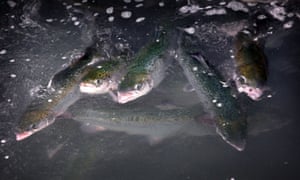Scotland’s industries and farmers must cut energy, greenhouse gas emissions and resource use as waste overtakes pollution as the major environmental threat, says head of regulator

Severin Carrell, Scotland editor
Scotland’s environment agency has warned the country’s industries and farmers that their waste and inefficiency is now the biggest threat to the environment, overtaking pollution.
In a marked shift in strategy, the regulator’s chief executive, Terry A’Hearn, will urge businesses, farmers and manufacturers to adopt a “one planet prosperity” policy designed to cut their energy use, greenhouse gas emissions, waste and resource use.
“The major threat to the environment now is that humanity is overusing the planet as a resource base,” he told the Guardian.
A’Hearn argues that the Scottish Environment Protection Agency (Sepa) has largely won the battle against so-called gross pollution from onshore sources. Air, water and soil pollution is now far below the levels seen decades ago.
Those were 20th-century problems, he said. But developed economies such as the UK’s are now consuming resources at a rate close to three times the planet’s actual capacity. “I’ve been extremely clear that if we have only one planet, we have to be really, really smart about how we use it,” he said.
Sepa, which is sister agency to the Environment Agency in England, has been given greater regulatory power and independence under legislation passed by the Scottish parliament in 2014, including greater freedom to fine polluters.
It is now able to levy fines as high as £40,000 without going through state prosecutors, imposing fixed penalties similar to those issued by police for driving offences, and has discretionary powers to penalize repeat offenders far more heavily for repeated breaches.
But Sepa’s data shows that 87% of Scottish businesses now have a good or excellent regulatory record, with only 7% rated as poor or very poor.
A’Hearn, an Australian who took over as Sepa chief executive last year after running Northern Ireland’s environment agency, said there were still sectors with “significant challenges”, particularly the fish farming industry.
Scottish salmon farms are repeatedly criticised by environment campaigners and other marine industries for heavy use of toxic chemicals to combat sea lice and disease, and seabed pollution caused by fish excrement. “There are still compliance issues here; we need to get on top of those,” A’Hearn said.
With an overall budget of £78m, Sepa has seen its government funding cut by about 25% in real terms over the last decade and is absorbing a 6% budget cut this year, down to £37m. Half its funds come from regulatory fees and other sources, helping cushion the impact of those cuts.
A’Hearn said its inspection regime would remain robust but in an article being posted on Sepa’s website later on Monday, he asserts that sustainable growth is now the core objective of its regulatory strategy.
“Our statutory purpose, to deliver environmental protection and improvement in ways which also create health and wellbeing benefits and sustainable economic growth, means that Sepa must undertake a very different role if we are to help create prosperity within our planet’s capacity to support it,” he states.
The aquaculture sector would be among the first to be approached by A’Hearn to establish new “sustainable growth agreements” which he said will be central to his new one planet strategy.
Based partly on a similar scheme he rolled out in Northern Ireland, voluntary but formal agreements would be struck with the most successful or progressive companies, or possibly on an industry-wide basis.
Companies which became sector champions would set targets or goals to increase efficiency and cut down waste; it would allow them to publicise that role in their marketing. Some highly integrated sectors such as the whisky industry, which has lately adopted more ambitious environmental policies, could sign industry-wide sustainability deals.
A’Hearn cited a deal signed by the aggregates and cement giant Lafarge on his second-last day as boss of the Northern Ireland agency. Lafarge agreed to pilot a scheme to take chicken manure from a major poultry farm and waste tyres as lower carbon fuel sources to generate the vast amounts of power needed for its cement factory at Cookstown.
Environmentalists fear that crowning some firms and industries as sustainability champions could lead to conflicts of interest and tensions for Sepa, if it had to crack down on pollution offences by that company or had to help adjudicate if a sector champion, say a fishfarm, wanted to open a new site or expand in a sensitive area.
A’Hearn said Sepa “won’t hesitate” in telling a firm that wants to expand that it can’t do so if it fails to protect the environment. “I don’t see any tension at all if we do it properly,” he said.
The opening passage of any sustainable growth agreement would ensure the business agrees to meet all compliance standards at all times. “If it becomes clear that they’re not willing to sign up to those, it’s clear then that they’re not best performers. I will be eyeballing CEO’s to test that,” he insisted.
- A reference to the Welsh environment agency was removed from this story on 9 August 2016.

